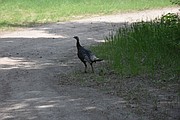'Tis the season for turkey chicks
Recently I was driving up the Ball Creek road west of the Westside Road and 10 miles north of the Kootenai National Wildlife Refuge headquarters when around a hairpin curve I saw a mother wild turkey nervously sitting on the ground with her wings spread out.
I waited to see what she would do and suddenly she stood up and revealed 10, one- or two-day old chicks. She walked a few steps away from the brood anxiously clucking as the chicks stayed frozen in place on the ground, not moving a feather. I took some pictures and she kept clucking but the chicks never moved. When I went back to the Jeep and left, the mother gave a loud cluck and the 10 wild turkey chicks instantly ran into the bushes at the side of the road.
Young turkeys need their mothers. Unlike baby songbirds and raptors, whose parents are absent for long periods gathering food to take back to their young in the nest, it is unnatural for young, ground nesting birds such as turkeys to be separated from their parent.
The mother turkey is the center of the young birds’ universe. During the first month when the young require brooding — being sheltered under the mother bird’s wings at night and periodically gathered beneath her wings for warmth and comfort during the day — the youngsters, called “poults,” will panic if separated from their mother. The terrified baby turkey gives out a “lost call” to which the mother turkey responds by running toward her little one, crouching and gathering him comfortingly under her wing.
They hurry along as if on a march to some particular point, sometimes tripping along in a single file, one behind the other, and at other times scattered through the woods for 50 yards or more. When on these scattered marches it is pleasant to note some straggling youngster as he wanders out of sight of the main flock in an attempt to catch a butterfly, or delays by the wayside scratching amid the remains of a decayed log in search of a rich morsel in the shape of a grub worm.
When he discovers that he is alone, he raises himself up, looks with his keen eyes in every direction for the flock, and, failing to discover them, gives the well-known coarse cluck. Then he raises his head high in the air, and listens intently for his mother’s call. As soon as it is discovered that one is missing, the whole flocks stops, and the young turkeys raise their heads and await the signal from their mother. When she hears the note of the lost youngster, she gives a few anxious “clucks,’ which he answers, and then, opening his wings, he gives a joyous flap or two and with a few sharp, quick “clucks,” he goes on a run to join his companions.
Enjoy Boundary County and all the wildlife babies that are being born this spring.



